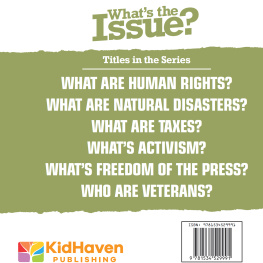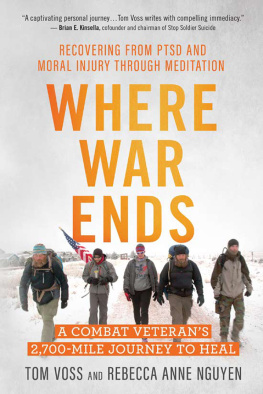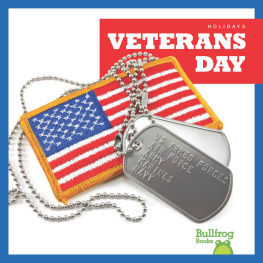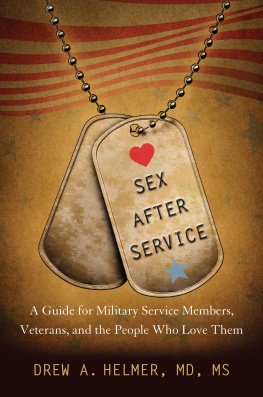Healing
Suicidal Veterans
Copyright 2009 by Victor Montgomery III, MAEd., CMAC, RAS
All rights reserved. No portion of this book may be reproduced or transmitted in any form whatsoever, including electronic, mechanical or any information storage or retrieval system, except as may be expressly permitted in the 1976 Copyright Act or in writing from the publisher. Requests for permission should be addressed to:
New Horizon Press
P.O. Box 669
Far Hills, NJ 07931
Montgomery III, Victor
Healing Suicidal Veterans: Recognizing, Supporting and Answering Their Pleas for Help
Cover design: Wendy Bass
Interior design: Susan Sanderson
Library of Congress Control Number: 2009922795
ISBN-13 (eBook): 978-0-88282-418-5
New Horizon Press
Manufactured in the U.S.A.
2013 2012 2011 2010 2009 / 5 4 3 2 1
Authors Note
Healing Suicidal Veterans is based on my research and personal experiences counseling and ministering to suicidal veterans and their families and friends. It is meant to reflect my discernment, sensitivity and observations of the personalities, events and conversations as well as the steps, strategies and measures taken to bring them help and hope. I have reconstructed from my recollection and memory of interviews the rescues and, in several cases, the outcomes.
I have taken full responsibility and caution in honoring the anonymity of the veterans, families and survivors around the country who have entrusted me with their stories. In order to protect the identity and privacy of others, I have changed the names of individuals and have altered identifying characteristics.
All references to the definitions of psychological and substance-related disorders come from the American Psychiatric Associations Diagnostic and Statistical Manual of Mental Disorders (4thed., Text Revision. Washington, D.C.: American Psychiatric Association, 2000).
For purposes of simplifying usage, the pronouns his/her and s/he are sometimes used interchangeably.
My opinions are based on my personal experience and do not represent those of the Department of Veterans Affairs or the United States government. This book is not intended to cure or treat injury, illness, disease or any other medical problem by the layman. The information contained herein is not meant to be a substitute for professional evaluation and therapy. Any application of the recommendations set forth in the following pages is at the readers discretion and sole risk.
Dedication
This book is for you, our American veterans, and your fathers, mothers, wives, husbands, sons, daughters, brothers, sisters, buddies, friends and extended family.
You have turned to this book with a purpose in mind. What are you looking for? My prayer and desire is that you are looking for HOPE. Whether you are looking at your loved one from the sidelines feeling helpless or are the one thinking of ending your own life, you are my most important person. I am writing to you and for you.
Please be aware you are not alone in this battle to understand the meaning of your life and purpose. Today your mind and heart may feel overwhelmed. Depression and suicidal feelings are signals to get help right away. There are psychological and medical treatments that will help you recover.
You served our country, went to war zones, were successful warriors and returned as veterans. All were admirable and, in many cases, heroic. But now you are unable to make a successful switch to a new phase in your life. Instead you have become one of the countless psychologically traumatized medical casualties of war.
I dedicate this volume to you, to all military personnel around the world in uniform today in Iraq and Afghanistan and to all veterans of prior years conflicts and wars. This book is especially for those of you who have returned home from foreign soil, forever changed men and women. And for your families and close friends, who in most cases are at home feeling helpless and hopeless watching their once energetic, happy and independent sons or daughters deteriorate physically, spiritually and emotionally before their very eyes.
Through my work I have come to realize that many veterans who served and are serving in war zones around the world think about taking their own lives. An extremely high percentage of returning veterans are using alcohol and other mind-altering chemicals to self-medicate and numb the mental pain and anguish from survivor guilt, loss of a friend, haunting flashbacks, ugly memories and nightmares. I know firsthand, working as a suicide crisis hotline interventionist and addiction therapist, that combat veteran suicides have become daily events. Statistical evidence shows this tragedy is a scourge that is on the rise.
I want to acquaint you with the veterans themselves and families like you and their true stories of suffering. I also want to share with you the ways in which they have learned to hope and triumph over their anguish. For you I present the information, insights and strategies in this book as an opportunity to grow and begin to heal and live again.
I have told you these things, so that
in me you may have peace. In this
world you will have trouble.
But take heart! I have overcome the
world.
John 16:33 (NIV)
Contents
As a professional suicide crisis intervention counselor working in outpatient clinics and on crisis hotlines, hour after hour I have heard the click and cylinder spin of a revolver as the shells were shuffled on a kitchen table and the rattle of a bottle of pills held near the telephone receiver with the threat of an impending overdose. Every day I witness the emotional cries of anger and rage, from the gut level, of men and women being tormented with feelings of hopelessness, abandonment and physical illnesses beyond their abilities to cope. Every day I hear despairing voices saying, I have nothing to live for.
Veteran suicides are steadily rising and raising alarms in both the homeless and veterans communities. Some returning veterans cant find jobs after leaving the military, some are losing their homes because of the mortgage and credit collapse and a good percentage of them begin or continue to struggle psychologically with their war experiences. Many feel the soldiers currently returning from Iraq and Afghanistan are just the beginning of an influx of new veterans in need.
Experience and research have revealed hospital emergency room psychiatric nurses and doctors from California to New York are overrun by depressed and suicidal veterans. Veterans Administration Medical Centers are understaffed and underfunded to handle the surge of veterans seeking psychological help. Most veterans are using alcohol and other drugs to mask and suppress the physiological and psychological pain caused by a myriad of injuries, disorders and illnesses. Many are diagnosed with post-traumatic stress disorder (PTSD).
Ilona Meagher collected statistics on military suicides for her Web site, PTSD Combat. Her research reveals:
The Army and VA also reported record increases in suicides for Afghanistan and Iraq combat veterans.2
Among the many hotline calls received are some from Desert Storm veterans who are suffering from the painful illness of fibromyalgia. Some believe this disease developed as a direct result of chemical warfare. I cant take the pain anymore is the resounding message from these vets. So many other callers are feeling miserable from physical wounds, such as learning to live without limbs or eyesight. Repeatedly I hear from male and female veterans of all ages, from all wars and foreign conflicts, struggling with the diagnosis of schizoaffective disorder, trauma-induced bipolar disorder, schizophrenia, depression and anxiety neuroses. These veterans tell me they are already taking prescribed medications and have been in therapy for years, yet are finding no relief and no resolution for their suffering.
Next page






